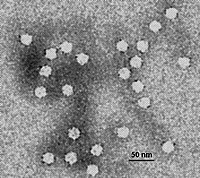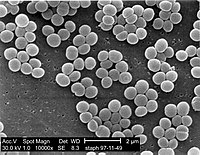
Amelioration of oxidative stress using N‐acetylcysteine in canine parvoviral enteritis
Sign Up to like & getrecommendations! Published in 2018 at "Journal of Veterinary Pharmacology and Therapeutics"
DOI: 10.1111/jvp.12434
Abstract: Previously, antioxidants have not been evaluated for treatment of parvoviral diarrhea in dogs. In this study, antioxidant potential of N‐acetylcysteine (NAC) in dogs infected with canine parvovirus with a nonblinded randomized clinical trial has been… read more here.
Keywords: parvo infected; treatment; supportive treatment; infected dogs ... See more keywords

Experimental infection of dogs with severe fever with thrombocytopenia syndrome virus: pathogenicity and potential for intraspecies transmission.
Sign Up to like & getrecommendations! Published in 2021 at "Transboundary and emerging diseases"
DOI: 10.1111/tbed.14372
Abstract: Severe fever with thrombocytopenia syndrome (SFTS) is caused by infection with Dabie Bandavirus [formerly SFTS virus (SFTSV)] and is an emerging zoonotic disease. Dogs can be infected with SFTSV, but its pathogenicity and transmissibility have… read more here.
Keywords: severe fever; thrombocytopenia syndrome; infection; fever thrombocytopenia ... See more keywords

Leishmania infantum xenodiagnosis from vertically infected dogs reveals significant skin tropism
Sign Up to like & getrecommendations! Published in 2021 at "PLoS Neglected Tropical Diseases"
DOI: 10.1371/journal.pntd.0009366
Abstract: Background Dogs are the primary reservoir for human visceral leishmaniasis due to Leishmania infantum. Phlebotomine sand flies maintain zoonotic transmission of parasites between dogs and humans. A subset of dogs is infected transplacentally during gestation,… read more here.
Keywords: sand; parasite burden; transmission; infected dogs ... See more keywords

Occurrence of Leishmania infantum in the central nervous system of naturally infected dogs: Parasite load, viability, co-infections and histological alterations
Sign Up to like & getrecommendations! Published in 2017 at "PLoS ONE"
DOI: 10.1371/journal.pone.0175588
Abstract: Zoonotic visceral leishmaniasis is caused by the protozoan Leishmania infantum and little is known about the occurrence and pathogenesis of this parasite in the CNS. The aims of this study were to evaluate the occurrence,… read more here.
Keywords: cns; occurrence; naturally infected; infected dogs ... See more keywords

Induction of miR 21 impairs the anti-Leishmania response through inhibition of IL-12 in canine splenic leukocytes
Sign Up to like & getrecommendations! Published in 2019 at "PLoS ONE"
DOI: 10.1371/journal.pone.0226192
Abstract: Visceral Leishmaniasis is a chronic zoonosis and, if left untreated, can be fatal. Infected dogs have decreased cellular immunity (Th1) and develop a potent humoral response (Th2), which is not effective for elimination of the… read more here.
Keywords: response; mir mir; mir; splenic leukocytes ... See more keywords

Prevalence, genetic, and biochemical evaluation of immune response of police dogs infected with Babesia vogeli
Sign Up to like & getrecommendations! Published in 2021 at "Veterinary World"
DOI: 10.14202/vetworld.2021.903-912
Abstract: Background and Aim: Babesia species are tick-borne protozoan parasites of apicomplexan type which infect the erythrocytes of dogs it ranges from subclinical to severe cases, depending on different factors such as immune status, age, and… read more here.
Keywords: babesia vogeli; infected dogs; prevalence genetic; police dogs ... See more keywords

New Observations Allowing the Differentiation of Late Asexual Stages of Cystoisospora canis from Developing Microgamonts in the Intestines of Experimentally Infected Dogs
Sign Up to like & getrecommendations! Published in 2019 at "Journal of Parasitology"
DOI: 10.1645/18-200
Abstract: ABSTRACT The coccidian parasite Cystoisospora canis (syn. Isospora canis) can cause clinical disease in dogs. Three generations of meronts are reported to occur in the small intestine of experimentally infected dogs before gametogony and oocyst… read more here.
Keywords: experimentally infected; late asexual; canis; new observations ... See more keywords

Haemato-biochemical Alterations in Canine Rotaviral Enteritis of Dogs and its Management
Sign Up to like & getrecommendations! Published in 2023 at "Indian Journal of Animal Research"
DOI: 10.18805/ijar.b-5010
Abstract: Background: Rotaviruses cause acute diarrhoea, mostly in young puppies. Rotavirus associated gastroenteritis in dog is of great concern not only because of their high morbidity and mortality, but became of the reason that, they act… read more here.
Keywords: infected dogs; alterations canine; biochemical alterations; haemato biochemical ... See more keywords

A One Medicine Mission for an Effective Rabies Therapy
Sign Up to like & getrecommendations! Published in 2022 at "Frontiers in Veterinary Science"
DOI: 10.3389/fvets.2022.867382
Abstract: Despite the disease's long history, little progress has been made toward a treatment for rabies. The prognosis for patient recovery remains dire. For any prospect of survival, patients require aggressive critical care, which physicians in… read more here.
Keywords: infected dogs; naturally infected; one medicine; mission ... See more keywords

Transmission of Methicillin-Resistant Staphylococcus spp. from Infected Dogs to the Home Environment and Owners
Sign Up to like & getrecommendations! Published in 2022 at "Antibiotics"
DOI: 10.3390/antibiotics11050637
Abstract: Dogs with methicillin-resistant Staphylococcus spp. (MRS) infections often undergo treatment in their homes, interacting with their owners and surroundings. This close contact between dogs and owners may facilitate the interspecies transmission of MRS. Therefore, this… read more here.
Keywords: infected dogs; methicillin resistant; staphylococcus spp; mrs ... See more keywords